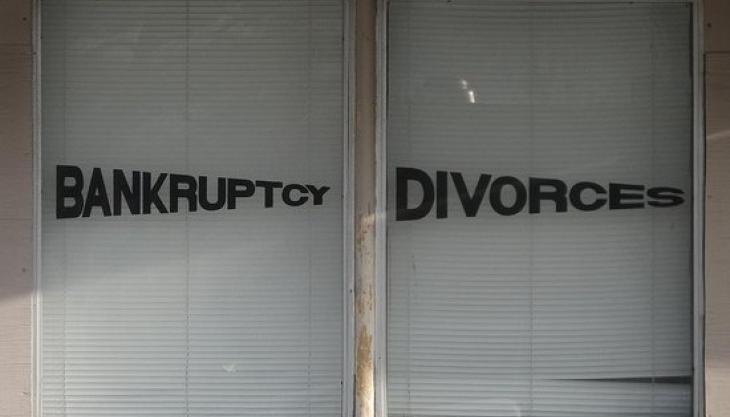Ready to Divorce But Stuck With Debt? Protect Yourself From Ex-Spouse Bankruptcy
Submitted by Rachel R on Wed, 02/22/2017 - 9:24am

Bankruptcy and divorce can be a win-win
Image Source: Flickr User Rusty Clark
Finances are the top source of problems, arguments, and stress in marriages. Sometimes, money troubles can get so bad that it rips a marriage apart. No matter the reason for your divorce, if you’re also stuck with financial difficulties, it’s usually best to sort out your money problems prior to your split. Here is what you need to know about divorce, financial obligations, and the possibility of bankruptcy.
Support vs. Non-Support Obligations
The issue with divorce, debt, and bankruptcy comes down to the difference between support and non-support obligations. A support obligation includes, but is not limited to, alimony and child support. But that may not be all of the financial assistance you get from divorce. Your debts may be divided so that your ex is paying some debt that’s in your name.
That carries the potential for trouble. If your ex is assigned to pay your car payment, credit card, or other debt, those are non-support obligations. So long as the payments are made on time and in full, it’s no big deal. However, if your ex doesn’t keep up with the payments, it can wreck your finances and credit score. If bankruptcy comes into the picture, you could be out of luck.
Chapter 13 vs. Chapter 7 Bankruptcy and Divorce
Not all bankruptcy chapters are the same when it comes to financial obligations created from divorce. If children are involved, there will likely be child support and also possibly spousal support. Child and spousal support will both stay intact despite bankruptcy, but other financial obligations could change. It’s important to know what to expect.
What can be affected is debt responsibility. If you divorce and your ex files Chapter 7 bankruptcy, all financial obligations should remain intact. But, for instance, if your ex is supposed to pay off your credit card as part of your divorce, and your ex files Chapter 13 bankruptcy, that could change. Anything that is not a support obligation is eligible for discharge in Chapter 13.
How to Avoid Post-Divorce Complications with Bankruptcy
If you’re discussing a split but have not divorced yet and have financial problems, you may be better off postponing the divorce until you have your financial mess sorted out. That will lead to fewer problems in the future and a clean financial break from your ex. Here are some things to consider when considering divorce while in debt:
- Wipe out debt before divorce
If possible, paying off debt prior to divorce is a wiser course. You likely accrued the debt together, so why not pay it off together? Splitting into two households doubles your expenses. If you can postpone the split, stay under one roof, and devote all your money to conquering debt, both partners can leave the marriage with more financial stability.
- Sort out the assets
For assets, deciding who gets what is critical. If assets have debt tied to them – such as a loan or mortgage – refinancing so that the person that keeps the asset also takes the debt is the better approach. That way, your ex isn’t making payments on assets in your possession. That can breed resentment, and if they stop making payments, it can cause you problems.
- Refinance debts instead of making pledges
For things you can’t afford to pay off, consider selling or refinancing. A car or house can be sold and the equity split between you after the sale. For credit card and other unsecured debts, doing a balance transfer may be a wiser approach so your ex isn’t paying on debt in your name and vice versa. That way, no one affects your credit score but you.
- Consider establishing liens
If you can’t divide everything up and get the assets and liabilities sorted down clean lines or can’t sell an asset right now but the equity is owed to both, a lien might be the solution. For instance, you can add a lien to your marital home so when the house sells after divorce, your claim is staked. Bankruptcy will not alter a lien, so you’re protected even if your ex files Chapter 7 or Chapter 13.
Considering Divorce but in Debt? Come See Us
For those North Carolina consumers struggling with debt and considering a divorce, consulting a family law attorney about the divorce and a bankruptcy attorney about the debt before acting might be the wisest approach. To talk about your debt and divorce, contact the Law Offices of John T. Orcutt. Call +1-833-627-0115 for a free North Carolina bankruptcy consultation today.
Come see our North Carolina bankruptcy experts at one of our locations in Raleigh, Durham, Fayetteville, Wilson, Greensboro or Wilmington.
Debts Hurt! Got debt? Need help? Get started below!
Serving All of North Carolina
- Bankruptcy Attorneys Raleigh NC (North)
- Bankruptcy Attorney Fayetteville NC
- Bankruptcy Attorney Durham NC
- Bankruptcy Attorneys Wilson NC
- Bankruptcy Attorneys Greensboro NC
- Bankruptcy Attorneys Southport NC
- Bankruptcy Attorneys Wilmington NC
Bankruptcy Attorneys Raleigh NC (North)
6616 Six Forks Rd #203 Raleigh, NC 27615 North Carolina
Tel: (919) 847-9750

Bankruptcy Attorney Fayetteville NC
2711 Breezewood Ave Fayetteville, NC 28303 North Carolina
Tel: (910) 323-2972

Bankruptcy Attorney Durham NC
1738 Hillandale Rd Suite D Durham, NC 27705 North Carolina
Tel: (919) 286-1695


Bankruptcy Attorneys Greensboro NC
2100 W Cornwallis Dr. STE O Greensboro, NC 27408 North Carolina
Tel: (336) 542-5993

Bankruptcy Attorneys Southport NC
116 N Howe St. Suite A Southport, NC 28461 North Carolina
Tel: (910) 218-8682

Bankruptcy Attorneys Wilmington NC
116 N. Howe Street, Suite A Southport, NC 28461 North Carolina
Tel: (910) 447-2987
